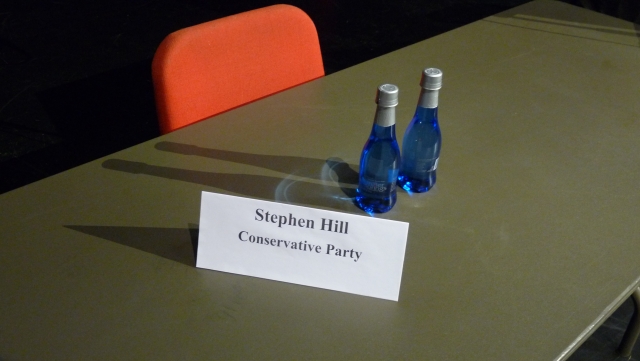Round two: candidates participate in non-debate in Grand Forks
In what was one of the friendliest political debates to ever take place the most obvious piece missing was the Conservative Party at the all candidates forum in Grand Forks on Monday night. Stephen Hill, previously confirmed for the debate, notified organizers at the last moment that he would not be attending leaving the three candidates from the Liberal, Green and New Democratic (NDP) parties to answer questions without the representative of the incumbent government. Moderated by Regional Director Grace McGregor, the forum saw the three parties discuss their platforms and personal intentions which, overall, are not radically different. People in the audience were disappointed that Hill was absent as many of their questions were targeted to him and his party. About 150 people came out to hear the forum held at Grand Forks Senior Secondary School auditorium. “If you look very carefully I think you’ll see Stephen’s spirit hovering over the table where his name is,” joked NDP Candidate and Incumbent Alex Atamanenko when an audience member asked a question aimed for Hill before going on to give his own response to the question. “Hopefully that spirit is taking (your) message to him and he’ll get back to you with an answer.” While the candidates present covered a diverse range of topics from senate and electoral reform, budgets, military spending, trade agreements, medical marijuana, to health care there was more agreement than debate at this forum. In opening remarks Liberal Candidate Shan Lavell stood strongly for the party’s platform focused on families and social issues. “My passion is children, my passion is families. The whole platform is about families. It’s about honouring what we do because really the economy is a social science – just another human behaviour,” said Lavell. “If we’re in fear then we’re not going to be doing very well. Canada spends .25 percent of its GDP on early childhood education. The Unicef and European benchmark is one percent. Canada is the lowest of the low of the big countries. It is all about creating the conditions for growth.” Atamanenko took his opening time to review foreign policy and the need for change at that level. “We’ve got to do something differently. We’ve kind of lost track with our foreign policy. In 2005 we all of a sudden ended up in a combat role in Afghanistan because the then General Hilliard persuaded the government of the day that we need to go into combat, probably to prove ourselves was the rationale,” said Atamanenko. “We need to change the way we do things folks in this country. We need to move back to the role of the country that moderates, the country that brings together a balanced foreign policy, and brings people together and works things out under the flag of the United Nations. We can do better. We should move back into peacekeeping.” Green Party representative Andy Shadrack spoke on behalf of candidate Bryan Hunt who could not attend the debate. Shadrack addressed the critical issue of budgets and the overwhelming federal debt. “The gross federal public debt is $46 billion higher than when Jean Cretien took over from Brian Mulroney. We are spending $93 million a day on debt servicing,” explained Shadrack. “We also know that we have the highest personal debt in this country. I feel that my generation – the baby boomers – have betrayed our own children in the terms of the debt that we’ve loaded them up with to get an education. (The Green Party) is the only party in this election that has submitted a full four year budget to the budget office in parliament. We propose to reduce the deficit in four years.” Shadrack went on to explain that the Green party would reduce debt through decreasing personal income taxes, removing the low corporate income tax and using a carbon tax. The rest of the evening was spent with questions from the audience on a range of topics. Atamanenko fielded questions from a knowledgeable base of experience in parliament, knowing how to stick-handle issues at the federal level without being a part of the majority government. Lavell presented well with her focus on the Liberal’s upstream-thinking platform of families first, affordable housing and childcare carrying her through the evening’s debate. Shadrack also impressed the audience as a seasoned politician with extensive knowledge and stayed on point in answering all questions. Even the contentious issue of medical marijuana did not give rise to debate as all candidates agreed that legalization with regulation and even possibly taxation was the answer, although Atamanenko was more cautious suggesting that only possession be decriminalized. “I think that the science behind harm reduction, the science behind bringing families together and creating strong attachments especially with youth as they move into their transitional time into adulthood – its well documented and researched within the social field that those are the determinants of health,” said Lavell. “I know that alcohol is by far the worst drug on a developing fetus. I think we’ve got other substances and we can add (marijuana) to that list and get rid of the high cost of the judicial system.” At one point Margaret Steele, a Grand Forks area resident, expressed her disappointment with the three candidates. “I don’t think I’ve ever heard so much agreement in a candidate’s forum. And I think that’s a problem. My greatest fear is that as a result of this election, the Harper government is going to have a majority. Or maybe another minority government,” said Steele. “I think part of the problem is that your three parties are running candidates in every riding. You’re splitting the progressive vote. I don’t recognize my country any more.” Local Nigel James asked what the candidate’s first task will be should they be elected to office, a question that gave each candidate the chance to step away from the party lines they had been promoting. Shadrack made it clear that electoral reform with proportional representation would be the Green’s key goal. Atamanenko focused on fighting international trade agreements, holding government accountable for commitments to local projects, and a return to the task of fighting genetically modified agriculture products. Lavell stayed on task with her personal platform saying that she would be primarily fighting for childcare and affordable housing which are critical to the ability of young people to succeed in Canada. While the debate gave an opportunity for the Grand Forks community to meet the candidates, the silence from the Conservative party spoke volumes for voters in the area leaving questions unanswered. To date this is the only debate that Hill chose not to attend. The forum was sponsored by the Boundary Sentinel and Community Futures Boundary. Elections will take place on May 2 across Canada to determine the new federal government. Advance polls will be open this week. Watch the debate from Monday night at:
Click on the pictures below to enlarge and view!























